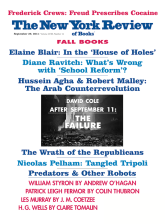In response to:
Flu Warning: Beware the Drug Companies! from the May 12, 2011 issue
To the Editors:
Helen Epstein’s recent article [“Flu Warning: Beware the Drug Companies!,” NYR, May 12] correctly highlights the pernicious role played by Big Pharma in major public health issues. Her treatment raises two important questions. The first is whether drug companies, through their advertising dollars, paid consultants, and grant-dependent rearchers, helped to create the tsunami of public fear that appeared in response to the bird flu (H5N1 virus) and swine flu (H1N1 virus) outbreaks or simply rode it.
I suggest that the latter is the case. The public hates the concept of triage. When it comes to health, they are full supporters of Cheney’s one percent doctrine, regardless of the cost. The Bush administration certainly had inordinately cozy ties with Big Pharma, but I doubt that any administration could have resisted the demand for stockpiling the neuraminidase inhibitor Tamiflu in response to the worldwide hysteria generated by the H5N1 virus in the mid-2000s.
The second question is whether the US Centers for Disease Control and Prevention (CDC) and the World Health Organization (WHO) have been complicit with drug companies in mischaracterizing the level of threat posed by recent viral outbreaks. I do not believe this to be the case. When a new disease appears, such as H5N1 in China in 1996, or an old disease appears in a new place, such as West Nile virus in Queens in 1999, the WHO and the CDC respond principally in two ways: (1) by setting up a website that maps each new appearance and describes each new finding concerning the disease as it is published; and (2) by convening a panel of scientific authorities who meet to consider all available information and provide advice on organizational response.
At least for the WHO, it is the panel that makes recommendations regarding a disease’s pandemic status, not administrators. Big Pharma, whose main focus is treatment, has very little leverage or control over panel experts. In the case of H5N1, the WHO panel consists of virologists, epidemiologists, public health experts, ornithologists, and poultry scientists (poultry are the main vector for H5N1 transmission), among others.
A colleague of mine, Dr. Zdeněk Hubálek from the Czech Republic, and I published an article during the height of the H5N1 outbreak in 2006 in which we stated that spread of this virus to the US was extremely unlikely, and that if it were to occur, would be readily isolated and controlled. We further suggested that the likely fate of the virus was not reassortment or mutation to a more deadly form readily transmissible to humans, but to a more benign form largely or completely confined to birds.
The panel did not ignore our work, which history has shown to have been accurate; but they could not make decisions and recommendations based on probabilities alone. Therefore they took the course of recommending preparation for the worst using flawed tools at the considerable expense summarized by Dr. Epstein. Even in hindsight, it is hard to fault their choice.
John Rappole
Research Scientist Emeritus
Smithsonian Conservation Biology Institute
Front Royal, Virginia
Helen Epstein replies:
It’s reassuring that the World Health Organization’s expert influenza panel accepted Dr. Rappole’s findings concerning avian influenza. However, it’s simply not true that “Big Pharma…has very little leverage or control over [the] panel experts” responsible for the H1N1 pandemic declaration. Several members of that panel had received large grants from the companies,* and even more importantly, the drug companies and their consultants had been sponsoring and drafting key sections of the WHO’s influenza preparedness response guidelines since 1999.
In response to a “pandemic declaration” these guidelines advised governments to (1) work with the media to publicize the threat, and (2) stockpile and prescribe Tamiflu. H1N1 was never presented as a “remote threat” but as a catastrophe. Ordinary people were rational to panic when the head of the CDC and the WHO announced that a “pandemic emergency” was underway. Were the companies “riding a wave” of public opinion? Sure, but the companies, and the agencies they influenced, generated that wave in the first place.
This Issue
September 29, 2011
School ‘Reform’: A Failing Grade
Coming Attractions
After September 11: The Failure



